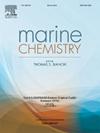QUODcarb: A Bayesian solver for over-determined datasets of seawater carbon dioxide system chemistry
IF 2.5
3区 地球科学
Q2 CHEMISTRY, MULTIDISCIPLINARY
引用次数: 0
Abstract
We present QUODcarb, a new solver for the CO2-system in seawater, designed to handle any combination of system parameter measurements, whether exactly- or over-determined. QUODcarb, which stands for Quantifying Uncertainty in an Over-Determined marine carbonate system, is formulated in terms of a Bayesian estimation problem. By combining prior thermodynamic information on the acid/base chemistry of CO2 in seawater with measured parameters and their uncertainties, QUODcarb yields a probability distribution for the true CO2-system state of a water parcel from which estimates of all system parameters with associated uncertainties can be obtained. By providing a single best estimate for the true CO2-system state, QUODcarb enables a simplified, more accurate internal consistency analysis of the marine CO2 system.
To demonstrate QUODcarb's utility, we analyze the GOMECC-3 dataset, that includes measurements of five CO2-system parameters. A key finding is that by analyzing these high-quality, over-determined measurements with QUODcarb, we can achieve the GOA-ON 1 % uncertainty goal for carbonate ion concentration, even when accounting for the propagated uncertainty in the dissociation constants – a level of accuracy unattainable with exactly determined calculations. Using a single internal consistency metric, we rank 26 alternative measurement combinations, finding that (pH, ) performs worst, while the combination with all five measurements performs best. Furthermore, the internally-consistent thermodynamic state estimates constrained by all five measurements fall within the range expected by the assumed measurement uncertainties for over 98 % of samples, with only minor adjustments to the dissociation constants, all of which remain within the reported uncertainties for their parameterized formulas.
海水二氧化碳系统化学超确定数据集的贝叶斯解算器
我们提出了QUODcarb,一种新的海水中二氧化碳系统求解器,设计用于处理系统参数测量的任何组合,无论是精确还是过度确定。QUODcarb,即在一个过度确定的海相碳酸盐系统中量化不确定性,是用贝叶斯估计问题来表述的。通过将海水中CO2的酸碱化学的先验热力学信息与测量参数及其不确定性相结合,QUODcarb得出了一个水包中CO2系统真实状态的概率分布,由此可以获得所有系统参数与相关不确定性的估计。通过提供对二氧化碳系统真实状态的单一最佳估计,QUODcarb可以对海洋二氧化碳系统进行简化、更准确的内部一致性分析。为了演示QUODcarb的实用性,我们分析了gomec -3数据集,其中包括五个co2系统参数的测量值。一个关键的发现是,通过用QUODcarb分析这些高质量的、过度确定的测量结果,我们可以实现GOA-ON 1%的碳酸盐离子浓度不确定度目标,即使考虑到解离常数的传播不确定度——精确计算无法达到的精度水平。使用单一的内部一致性度量,我们对26种替代测量组合进行了排名,发现(pH, pCO2)表现最差,而所有五种测量组合表现最佳。此外,所有五种测量约束下的内部一致热力学状态估计都在98%以上样品的假设测量不确定度所期望的范围内,只有对解离常数进行了微小的调整,所有这些都保持在其参数化公式的报告不确定度之内。
本文章由计算机程序翻译,如有差异,请以英文原文为准。
求助全文
约1分钟内获得全文
求助全文
来源期刊

Marine Chemistry
化学-海洋学
CiteScore
6.00
自引率
3.30%
发文量
70
审稿时长
4.5 months
期刊介绍:
Marine Chemistry is an international medium for the publication of original studies and occasional reviews in the field of chemistry in the marine environment, with emphasis on the dynamic approach. The journal endeavours to cover all aspects, from chemical processes to theoretical and experimental work, and, by providing a central channel of communication, to speed the flow of information in this relatively new and rapidly expanding discipline.
 求助内容:
求助内容: 应助结果提醒方式:
应助结果提醒方式:


